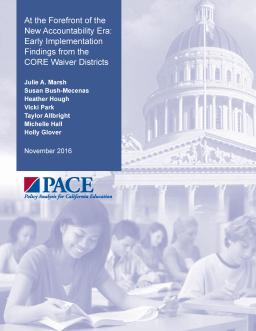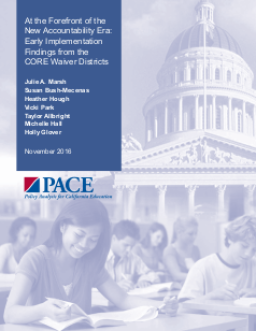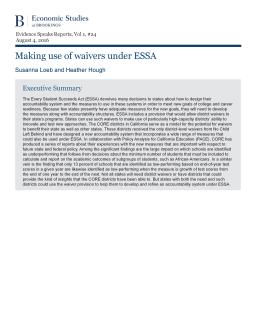Published
Summary
The Every Student Succeeds Act (ESSA) allows states to reshape their school accountability systems. One dominant model is the letter-grade system first adopted by Florida, while California is developing a dashboard-style system that encompasses multiple measures such as student attendance and school climate. Former Florida Governor Jeb Bush presents the case for summative ratings, while Heather J. Hough and Michael W. Kirst of PACE stress the importance of multiple measures.
Insights From California’s CORE Waiver Districts
Published
Summary
California's Local Control Funding Formula (LCFF) aims to improve educational equity by providing additional funds to districts with disadvantaged students. Districts are required to engage with their communities and develop Local Control Accountability Plans (LCAPs) to identify priorities and allocate funds. However, there are concerns about the quality of LCAPs, lack of stakeholder involvement, and limited transparency. To improve the effectiveness of LCFF, districts must ensure meaningful stakeholder engagement and use data to guide decision-making.
Early Implementation Findings from the CORE Waiver Districts
Published
Summary
The Local Control and Accountability Plan (LCAP) in California and the federal Every Student Succeeds Act (ESSA) encourage local control in school accountability. The CORE waiver districts have implemented an innovative measurement system and supports for school and district improvement, providing an opportunity to learn from the enactment of a system supported by accountability policy in this new era. This report examines the early implementation and effects of the CORE reform and seeks to inform the ongoing efforts within CORE and future accountability policy in other states and districts.
Learning from the CORE Districts' Focus on Measurement, Capacity Building, and Shared Accountability
Published
Summary
California and the US are undergoing a cultural shift in school accountability policies towards locally-determined measures of school performance. Lessons can be learned from the CORE districts, which developed an innovative accountability system, emphasizing support over sanctions, and utilizing multiple measures of school quality. The CORE districts' measurement system and collaboration hold promise for improving local systems, but efforts to build capacity remain a work in progress.
Published
Summary
ESSA allows states to design accountability systems and measures to meet new college and career readiness goals. With the lack of adequate measures, states will need to develop new measures and structures. The CORE Districts in CA, with its innovative accountability system and waivers from No Child Left Behind, is a model for other states. Reports from CORE-PACE highlight the impact of decisions such as subgroup sizes and test score growth on identifying low-performing schools. States can use the district waiver provision to help develop and refine their accountability systems under ESSA.




